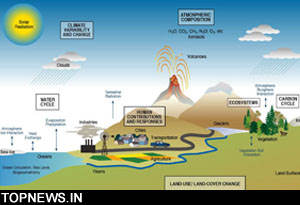Climate changing faster than expected, adaption measures needed
 Geneva - Climate change and its effects are occurring at a faster rate than scientists previously thought, a conservation group said Thursday, calling for governments to take action at an upcoming United Nations conference in Poland.
Geneva - Climate change and its effects are occurring at a faster rate than scientists previously thought, a conservation group said Thursday, calling for governments to take action at an upcoming United Nations conference in Poland.
"We are now seeing devastating consequences of warming that were not expected to hit for decades," Kim Carstensen from the World Wide Fund For Nature (WWF) said.
"We need to see signals for immediate action," she said, calling for governments at the UN Conference on Climate Change in Poznan, set to begin next week, to cut back on emissions of greenhouses gases.
Otherwise, the average annual temperature of the planet could rise by 2 degrees Celsius, the so-called "threshold point."
The WWF study said that such a rise in temperature would cause further melting of the ice in the Arctic and Greenland, leading to rising sea levels and other problems for millions around the world.
Already a less than 1 degree rise has drastically changed the Arctic Ocean and reduced ice levels, and the delegates at Poznan faced a "closing window of opportunity" to stop further dramatic changes.
An official with the World Meteorological Organization, a UN body, said states needed to work on preparations for the impact of the changes that are already taking place.
"Mitigation measures are needed, but they will not allow us to cope with all the impacts of climate change," said Carine Richard-Van Maele.
"They need to be complimented by strategies for climate adaptation," she told told Deutsche Presse-Agentur dpa, adding that otherwise food security would be compromised and natural disasters would have a harsher impact.
Past actions, she said, had already caused problems that need to be handled.
Man-made emissions from fossil fuels have increased 400 per cent in the past decade when compared to the previous one, while the carbon storage capacity of the oceans have been steadily decreasing, the WWF study showed. dpa